Citroen GRAND C4 PICASSO RHD 2016 2.G Owner's Manual
Manufacturer: CITROEN, Model Year: 2016, Model line: GRAND C4 PICASSO RHD, Model: Citroen GRAND C4 PICASSO RHD 2016 2.GPages: 523, PDF Size: 13.63 MB
Page 271 of 523
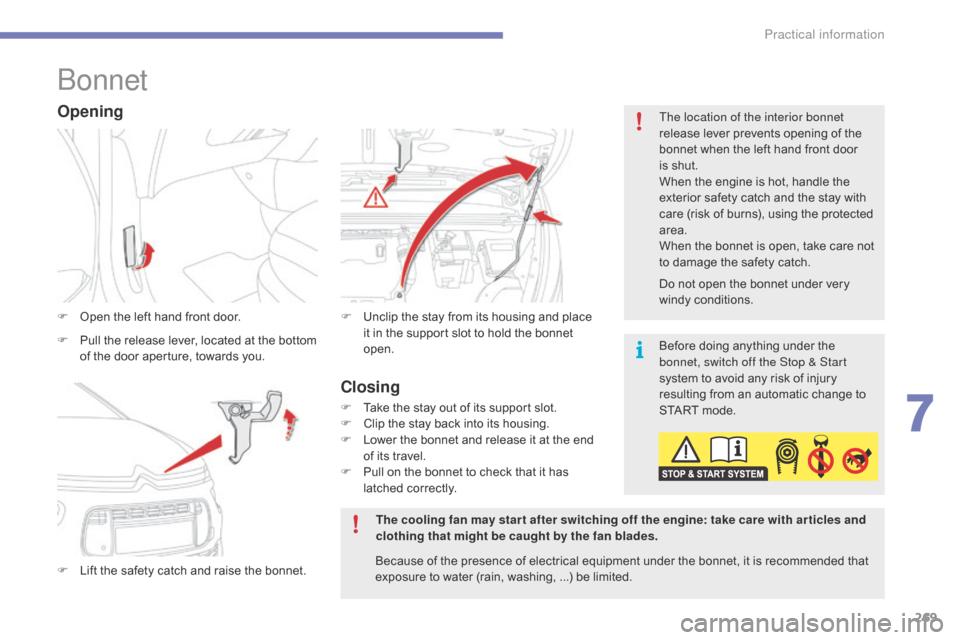
269
Bonnet
F Open the left hand front door.
F
L
ift the safety catch and raise the bonnet.F
U nclip the stay from its housing and place i
t in the support slot to hold the bonnet
ope
n.
Opening
F Pull the release lever, located at the bottom o
f the door aperture, towards you. Before
doing anything under the
b
onnet, switch off the Stop & Start
system
to avoid any risk of injury
r
esulting from an automatic change to
S
TART mode.
The cooling fan may star t after switching off the engine: take care with ar ticles and
clothing that might be caught by the fan blades. Do
not open the bonnet under very
wi
ndy
c
onditions.
The location of the interior bonnet
release lever prevents opening of the
b
onnet when the left hand front door
i
s shut.
When the engine is hot, handle the
e
xterior safety catch and the stay with
c
are (risk of burns), using the protected
a
rea.
When the bonnet is open, take care not
t
o damage the safety catch.
Because of the presence of electrical equipment under the bonnet, it is recommended that
e
xposure to water (rain, washing, ...) be limited.
Closing
F Take the stay out of its support slot.
F C lip the stay back into its housing.
F
L
ower the bonnet and release it at the end
o
f its travel.
F
P
ull on the bonnet to check that it has
l
atched correctly.
7
Practical information
Page 272 of 523
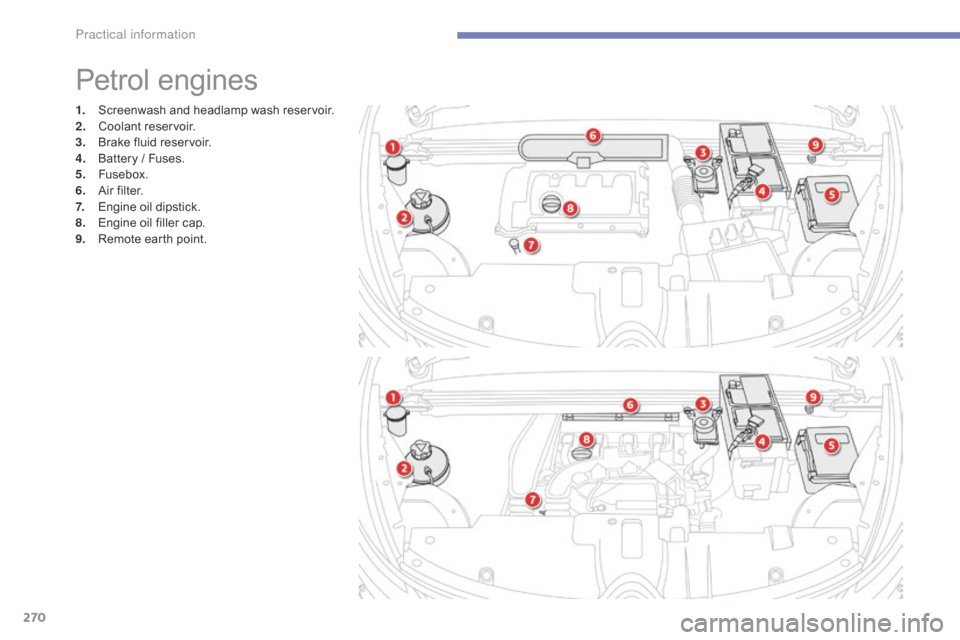
270
1. Screenwash and headlamp wash reservoir.
2. C oolant r eservoir.
3.
B
rake fluid reservoir.
4.
B
attery / Fuses.
5.
F
usebox.
6.
A
ir filter.
7.
E
ngine oil dipstick.
8.
E
ngine oil filler cap.
9.
R
emote earth point.
Petrol engines
Practical information
Page 273 of 523
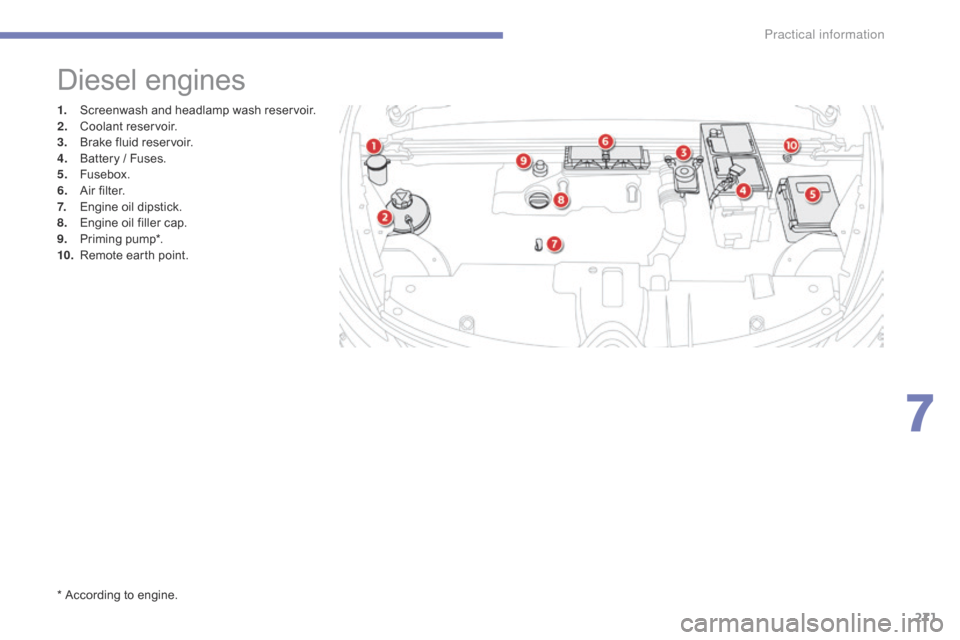
271
1. Screenwash and headlamp wash reservoir.
2. C oolant r eservoir.
3.
B
rake fluid reservoir.
4.
B
attery / Fuses.
5.
F
usebox.
6.
A
ir filter.
7.
E
ngine oil dipstick.
8.
E
ngine oil filler cap.
9.
P
riming
pu
mp*.
10.
R
emote earth point.
Diesel engines
* According to engine.
7
Practical information
Page 274 of 523
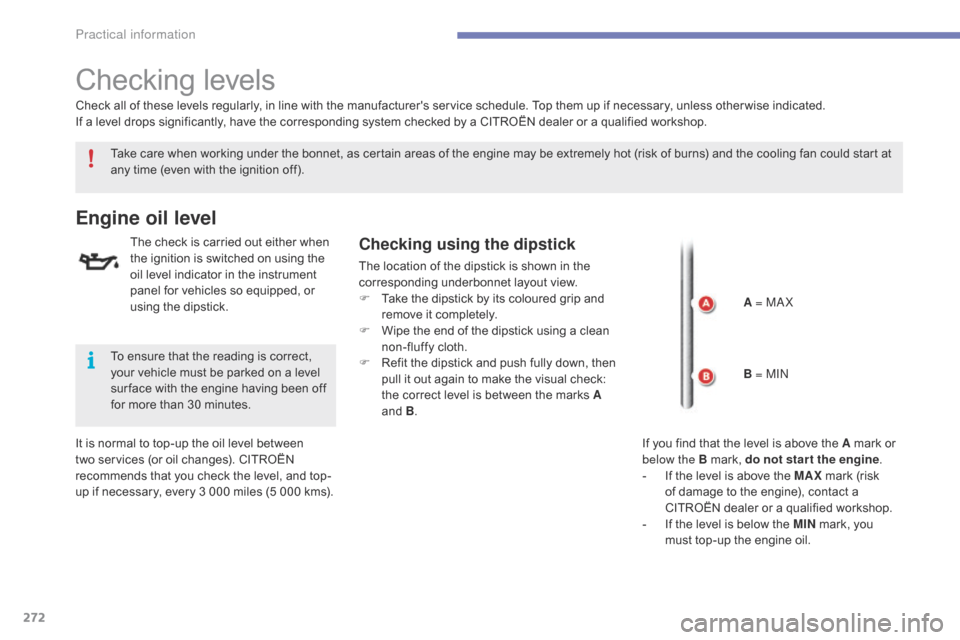
272
Checking levels
Take care when working under the bonnet, as certain areas of the engine may be extremely hot (risk of burns) and the cooling fan could start at any time (even with the ignition off).
Engine oil level
The check is carried out either when the ignition is switched on using the
o
il level indicator in the instrument
p
anel for vehicles so equipped, or
u
sing the dipstick.Checking using the dipstick
The location of the dipstick is shown in the corresponding underbonnet layout view.
F
T
ake the dipstick by its coloured grip and
r
emove it completely.
F
W
ipe the end of the dipstick using a clean
n
on-fluffy cloth.
F
R
efit the dipstick and push fully down, then
p
ull it out again to make the visual check:
t
he correct level is between the marks A
and
B.
It
is
normal
to
top-up
the
oil
level
between
t
wo
services
(or
oil
changes).
CITROËN
r
ecommends
that
you
check
the
level,
and
top-
up
if
necessary,
every
3
000
miles
(5
000
kms).
Check
all
of
these
levels
regularly,
in
line
with
the
manufacturer's service schedule. Top them up if necessary, unless other wise indicated.
If
a
level
drops
significantly,
have
the
corresponding system checked by a CITROËN dealer or a qualified workshop.
To
ensure
that
the
reading
is
correct,
y
our
vehicle
must
be
parked
on
a
level
s
ur face
with
the
engine
having
been
off
f
or
more
than
30
minutes. A = MA X
B = MIN
If
you find that the level is above the A mark or
belo
w the B mark, do not star t the engine.
-
I
f the level is above the MAX
mark (risk
o
f damage to the engine), contact a
C
ITROËN dealer or a qualified workshop.
-
I
f the level is below the MIN
mark, you
m
ust top-up the engine oil.
Practical information
Page 275 of 523
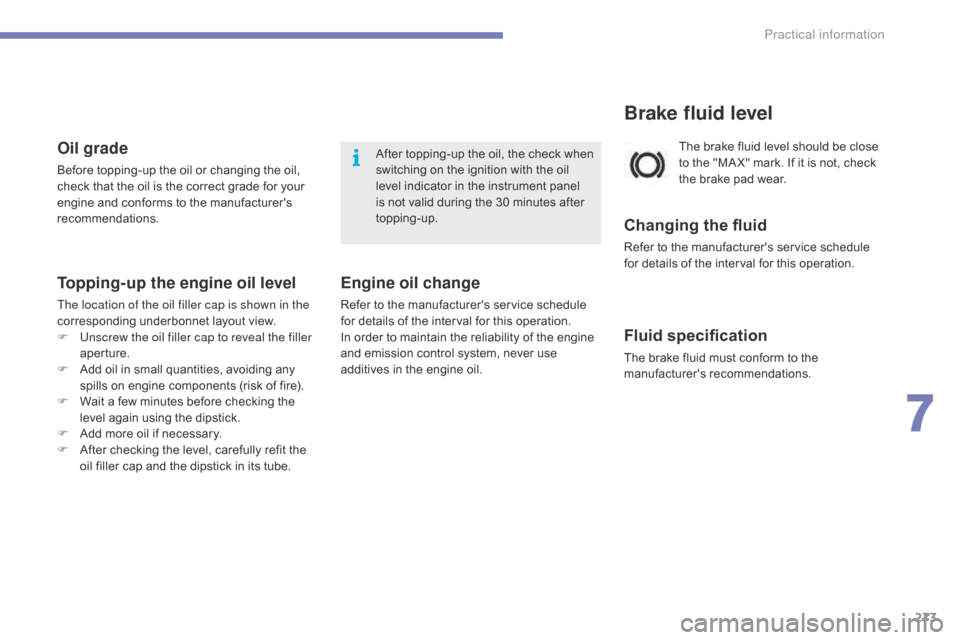
273
The brake fluid level should be close to the "MA X" mark. If it is not, check
t
he brake pad wear.
Brake fluid level
Changing the fluid
Refer to the manufacturer's service schedule for details of the interval for this operation.
Fluid specification
The brake fluid must conform to the manufacturer's r ecommendations.
Topping-up the engine oil level
The location of the oil filler cap is shown in the
corresponding underbonnet layout view.
F
U
nscrew the oil filler cap to reveal the filler
aperture.
F
A
dd oil in small quantities, avoiding any
s
pills on engine components (risk of fire).
F
W
ait a few minutes before checking the
l
evel again using the dipstick.
F
A
dd more oil if necessary.
F
A
fter checking the level, carefully refit the
o
il filler cap and the dipstick in its tube.
Engine oil change
Refer to the manufacturer's service schedule for details of the interval for this operation.
In
order to maintain the reliability of the engine
a
nd emission control system, never use
a
dditives in the engine oil.
After
topping-up the oil, the check when
s
witching on the ignition with the oil
l
evel indicator in the instrument panel
i
s not valid during the 30 minutes after
t
opping-up.
Oil grade
Before topping-up the oil or changing the oil, c
heck that the oil is the correct grade for your
e
ngine and conforms to the manufacturer's
r
ecommendations.
7
Practical information
Page 276 of 523
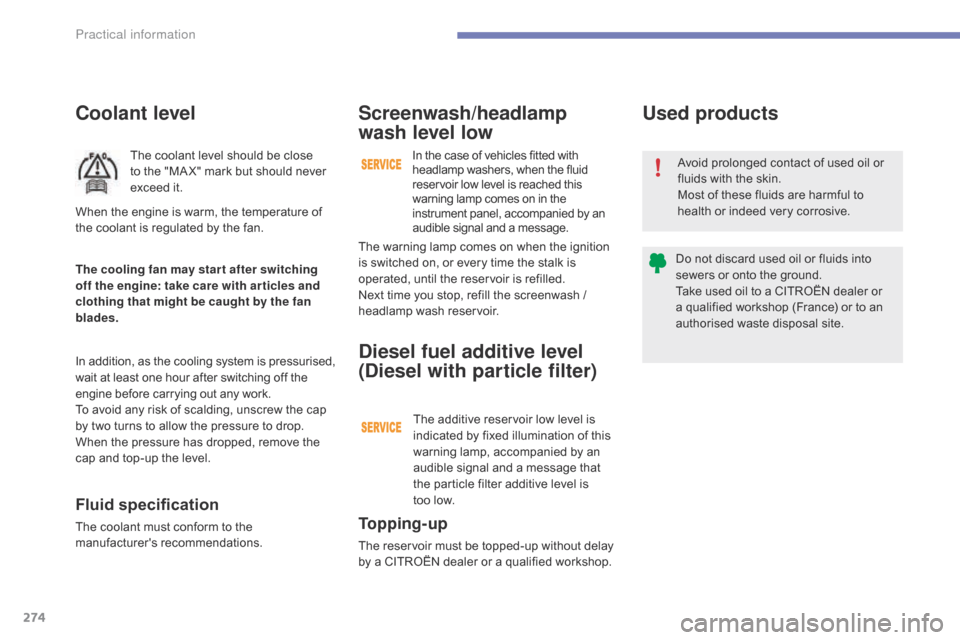
274
Coolant level
The coolant level should be close to the "MA X" mark but should never
e
xceed it.
In
addition, as the cooling system is pressurised,
w
ait
at
least one hour after switching off the
e
ngine
before carrying out any work.
To
avoid
any risk of scalding, unscrew the cap
b
y
two
turns to allow the pressure to drop.
W
hen
the
pressure has dropped, remove the
c
ap
and
top-up the level.
Fluid specification
The coolant must conform to the manufacturer's r ecommendations.
The cooling fan may star t after switching
off the engine: take care with ar ticles and
clothing that might be caught by the fan
blades. When the engine is warm, the temperature of
t
he coolant is regulated by the fan.To p p i n g - u p
The reservoir must be topped-up without delay b
y a CITROËN dealer or a qualified workshop.
Diesel fuel additive level
(Diesel with particle filter)
The additive reservoir low level is indicated by fixed illumination of this
w
arning lamp, accompanied by an
a
udible signal and a message that
t
he particle filter additive level is
t
oo low.
The
warning lamp comes on when the ignition
i
s
switched on, or every time the stalk is
o
perated,
until the reservoir is refilled.
Next
time
you stop, refill the screenwash /
h
eadlamp
wash reservoir.
Screenwash/headlamp
wash level low
In the case of vehicles fitted with h
eadlamp washers, when the fluid r
eservoir low level is reached this
w
arning lamp comes on in the
i
nstrument panel, accompanied by an
a
udible signal and a message. Avoid
prolonged contact of used oil or
f
luids with the skin.
Most
of these fluids are harmful to
h
ealth or indeed very corrosive.
Do
not discard used oil or fluids into
s
ewers or onto the ground.
Take
used oil to a CITROËN dealer or
a
qualified workshop (France) or to an
a
uthorised waste disposal site.
Used products
Practical information
Page 277 of 523
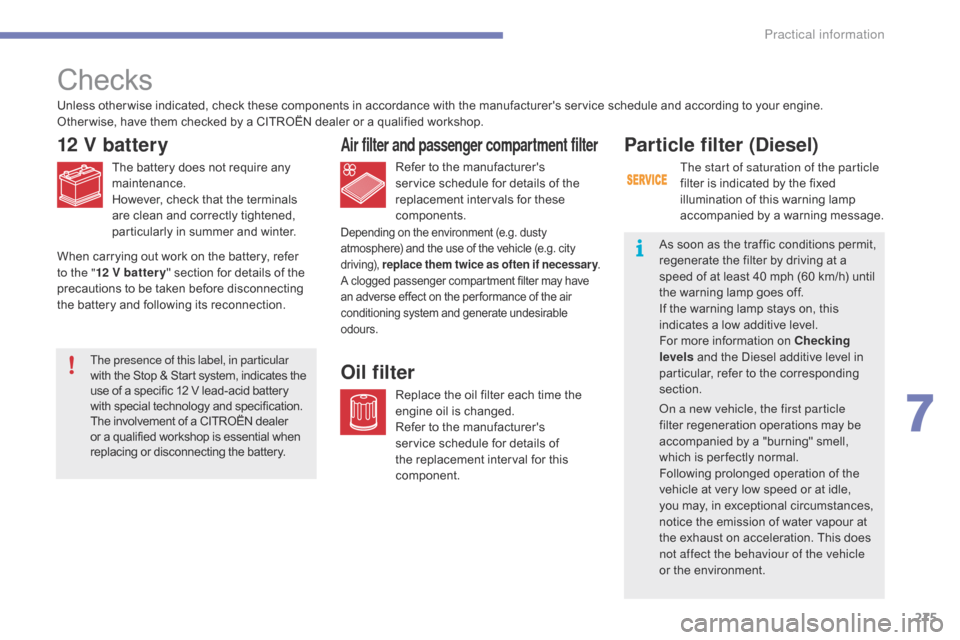
275
Checks
12 V battery
The battery does not require any maintenance.
However,
check that the terminals
a
re clean and correctly tightened,
p
articularly in summer and winter.Refer
to the manufacturer's s
ervice schedule for details of the
r
eplacement intervals for these
c
omponents.
Air filter and passenger compartment filter
Replace the oil filter each time the engine oil is changed.
Refer
to the manufacturer's
s
ervice schedule for details of
t
he replacement interval for this
c
omponent.
Oil filterThe presence of this label, in particular
with the Stop & Start system, indicates the u
se of a specific 12 V lead-acid battery
w
ith special technology and specification.
T
he involvement of a CITROËN dealer
o
r a qualified workshop is essential when
r
eplacing or disconnecting the battery.
Unless
other wise indicated, check these components in accordance with the manufacturer's service schedule and according to your engine.
Other wise, have them checked by a CITROËN dealer or a qualified workshop.
Depending on the environment (e.g. dusty a
tmosphere) and the use of the vehicle (e.g. city d
riving),
r
eplace them twice as often if necessar y .
A
clogged passenger compartment filter may have
a
n adverse effect on the per formance of the air
c
onditioning system and generate undesirable
o
dours.
Particle filter (Diesel)
The start of saturation of the particle
filter is indicated by the fixed
i
llumination of this warning lamp
a
ccompanied by a warning message.
As
soon as the traffic conditions permit,
r
egenerate the filter by driving at a
s
peed of at least 40 mph (60 km/h) until
t
he
warning lamp goes off.
If
the warning lamp stays on, this
i
ndicates a low additive level.
For
more information on Checking
levels
and the Diesel additive level in
p
articular, refer to the corresponding
s
ection.
On a new vehicle, the first particle
filter
regeneration operations may be
a
ccompanied by a "burning" smell,
w
hich is per fectly normal.
Following
prolonged operation of the
v
ehicle at very low speed or at idle,
y
ou
may, in exceptional circumstances,
n
otice the emission of water vapour at
t
he
exhaust on acceleration. This does
n
ot affect the behaviour of the vehicle
or
the environment.
When
carrying
out
work
on
the
battery,
refer
t
o the " 12 V batter y "
section
for
details
of
the
p
recautions
to
be
taken
before
disconnecting
t
he
battery
and
following
its
reconnection.
7
Practical information
Page 278 of 523
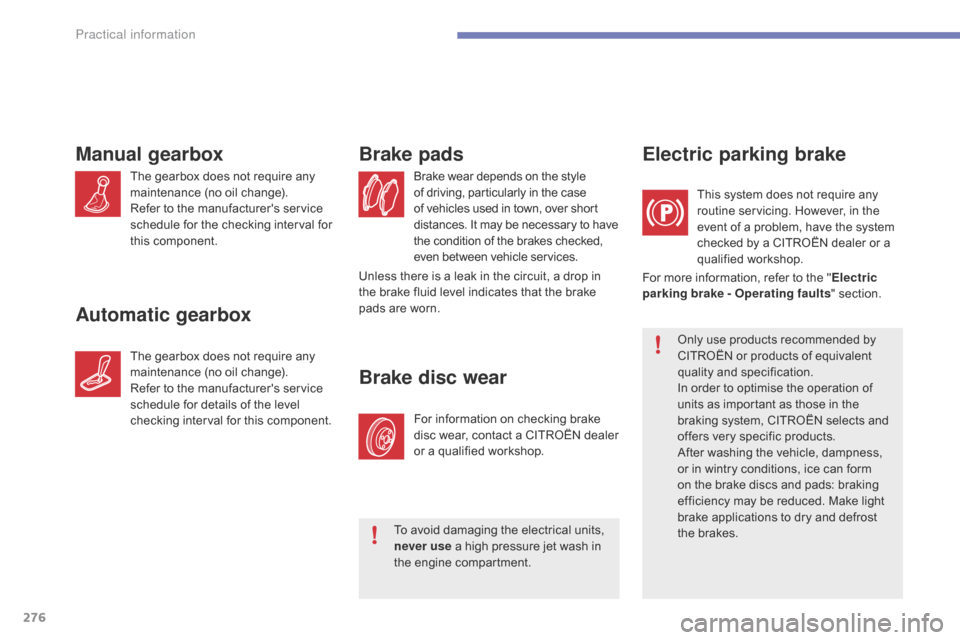
276
Brake wear depends on the style of driving, particularly in the case o
f vehicles used in town, over short
d
istances. It may be necessary to have
t
he condition of the brakes checked,
e
ven between vehicle services.
Brake pads
For information on checking brake disc wear, contact a CITROËN dealer
o
r a qualified workshop.
Brake disc wear
Only use products recommended by CITROËN or products of equivalent
q
uality
an
d
sp
ecification.
In
order to optimise the operation of
u
nits as important as those in the
b
raking system, CITROËN selects and
o
ffers very specific products.
After
washing the vehicle, dampness,
o
r in wintry conditions, ice can form
o
n the brake discs and pads: braking
e
fficiency may be reduced. Make light
b
rake applications to dry and defrost
t
he brakes.
Electric parking brake
For more information, refer to the "E lectric
parking brake - Operating faults "
section.
This
system does not require any
r
outine servicing. However, in the
e
vent of a problem, have the system
c
hecked by a CITROËN dealer or a
q
ualified
w
orkshop.
Manual gearbox
The gearbox does not require any m
aintenance (no oil change).
Refer
to the manufacturer's service
s
chedule for the checking interval for
t
his
c
omponent.
Automatic gearbox
The gearbox does not require any maintenance (no oil change).
Refer
to the manufacturer's service
s
chedule for details of the level
c
hecking interval for this component.
To
avoid damaging the electrical units,
n
ever use a high pressure jet wash in
t
he engine compartment.
Unless
there is a leak in the circuit, a drop in
t
he brake fluid level indicates that the brake
p
ads are worn.
Practical information
Page 279 of 523
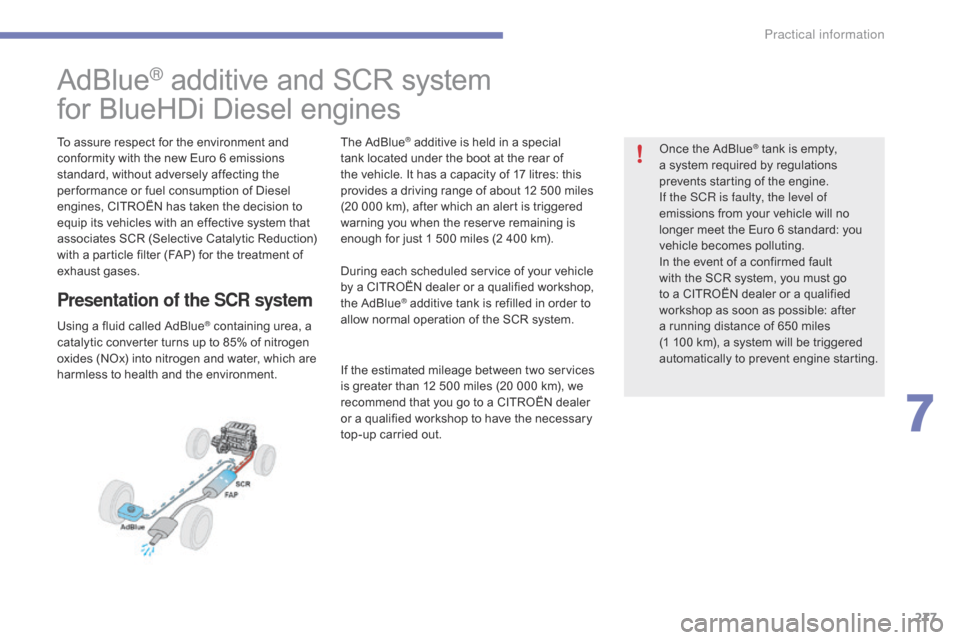
277
AdBlue® additive and SCR system
f
or
BlueHDi Diesel engines
To assure respect for the environment and c
onformity with the new Euro 6 emissions
s
tandard, without adversely affecting the
p
er formance or fuel consumption of Diesel
e
ngines, CITROËN has taken the decision to
e
quip its vehicles with an effective system that
a
ssociates SCR (Selective Catalytic Reduction)
w
ith a particle filter (FAP) for the treatment of
e
xhaust gases.
Presentation of the SCR system
Using a fluid called AdBlue® containing urea, a c
atalytic
converter
turns
up
to 85% of nitrogen
o
xides
(NOx)
into
nitrogen
and water, which are
h
armless
to
health
and
the
environment. The
AdBlue
® additive is held in a special t
ank
located
under the boot at the rear of
t
he
vehicle.
It has a capacity of 17 litres: this
p
rovides
a
driving range of about 12 500 miles
(
20
000
km),
after which an alert is triggered
w
arning
you
when the reserve remaining is
e
nough
for
just 1 500 miles (2 400 km).
During
each
scheduled service of your vehicle
b
y
a
CITROËN dealer or a qualified workshop,
t
he
AdBlue
® additive tank is refilled in order to a
llow
normal operation of the SCR system.
If
the
estimated mileage between two services
i
s
greater
than 12 500 miles (20 000 km), we
r
ecommend
that you go to a CITROËN dealer
o
r
a
qualified workshop to have the necessary
t
op-up
carried out. Once
the AdBlue
® tank is empty, a s
ystem
required
by regulations
p
revents
starting
of the engine.
If the SCR
is faulty, the level of
emissions
from
your vehicle will no
l
onger
meet
the
Euro 6 standard: you
v
ehicle
becomes
polluting.
In
the
event
of
a
confirmed fault
w
ith
the
SCR
system, you must go
t
o
a
CITROËN
dealer or a qualified
w
orkshop
as
soon as possible: after
a
running
distance of 650 miles
(
1 100
km),
a
system will be triggered
a
utomatically
to
prevent engine starting.
7
Practical information
Page 280 of 523
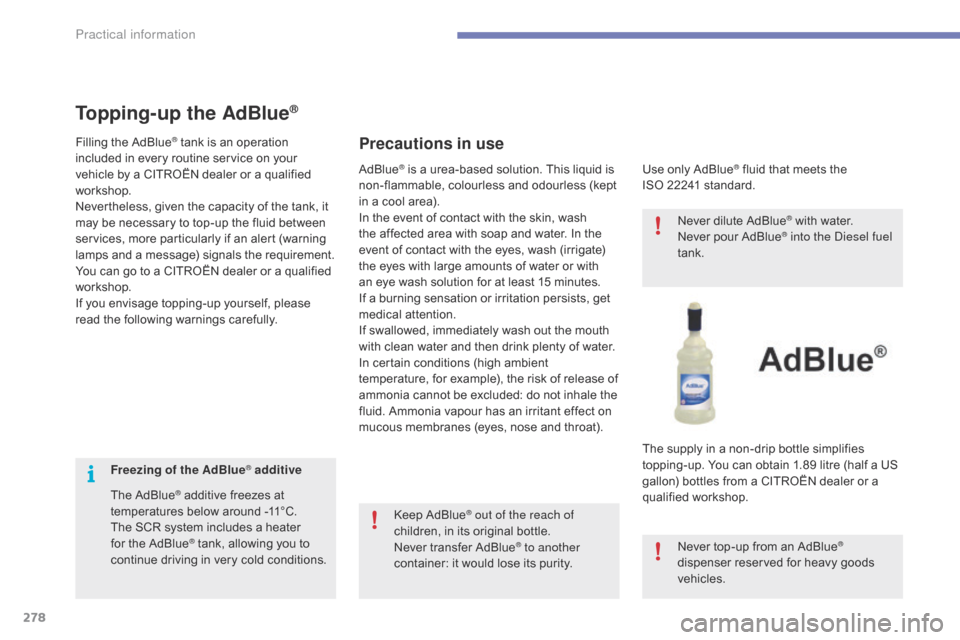
278
Freezing of the AdBlue® additive
The
AdBlue
® additive freezes at t
emperatures below around -11°C.
The
SCR
system includes a heater
f
or
the
AdBlue
® tank, allowing you to c
ontinue
driving in very cold conditions.
Topping-up the AdBlue®
Filling the AdBlue® tank is an operation i
ncluded
in
every
routine service on your
v
ehicle
by
a
CITROËN dealer or a qualified
w
orkshop.
Nevertheless,
given the capacity of the tank, it
m
ay
be
necessary
to top-up the fluid between
s
ervices,
more
particularly if an alert (warning
l
amps
and
a
message) signals the requirement.
You
can
go
to
a
CITROËN dealer or a qualified
w
orkshop.
If
you
envisage
topping-up yourself, please
r
ead
the
following
warnings carefully.Precautions in use
Use only AdBlue® fluid that meets the I
SO 22241
standard.
AdBlue® is a urea-based solution. This liquid is n
on-flammable, colourless and odourless (kept
i
n
a
cool area).
In
the
event of contact with the skin, wash
t
he
affected area with soap and water. In the
e
vent
of
contact with the eyes, wash (irrigate)
t
he
eyes with large amounts of water or with
a
n
eye
wash solution for at least 15 minutes.
I
f
a
burning sensation or irritation persists, get
m
edical
attention.
If
swallowed, immediately wash out the mouth
w
ith
clean water and then drink plenty of water.
In
certain conditions (high ambient
t
emperature, for example), the risk of release of
a
mmonia cannot be excluded: do not inhale the
f
luid.
Ammonia vapour has an irritant effect on
m
ucous
membranes (eyes, nose and throat).The
supply in a non-drip bottle simplifies
t
opping-up. You can obtain 1.89 litre (half a US
g
allon) bottles from a CITROËN dealer or a
q
ualified
w
orkshop.
Never
dilute AdBlue
® with water.
N
ever
pour
AdBlue® into the Diesel fuel
tank.
Never
top-up
from
an AdBlue
®
dispenser
reserved
for
heavy
goods
v
ehicles.
Keep
AdBlue
® out of the reach of
children,
in
its
original bottle.
Never
transfer AdBlue
® to another
container:
it
would
lose
its purity.
Practical information